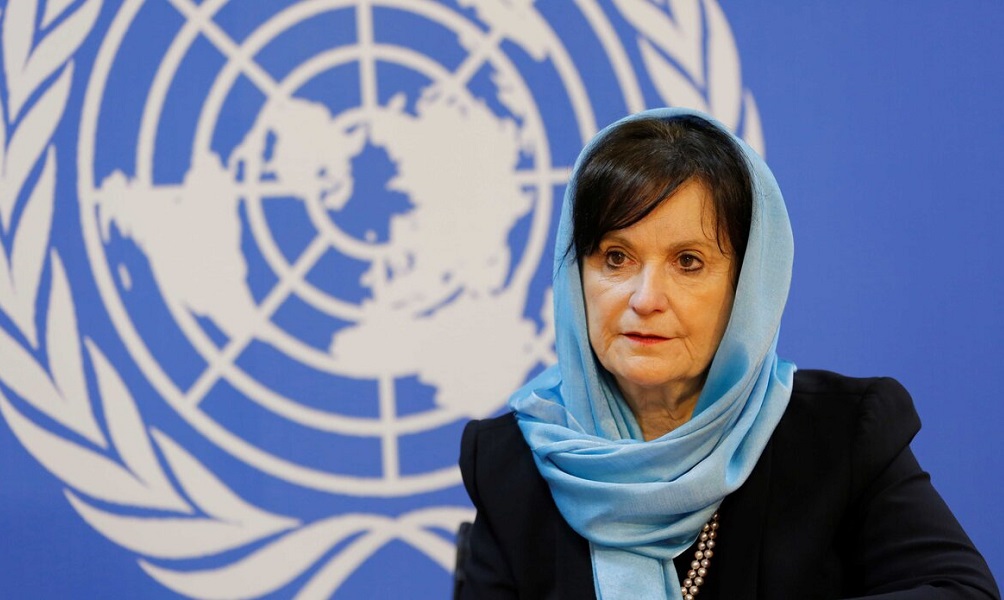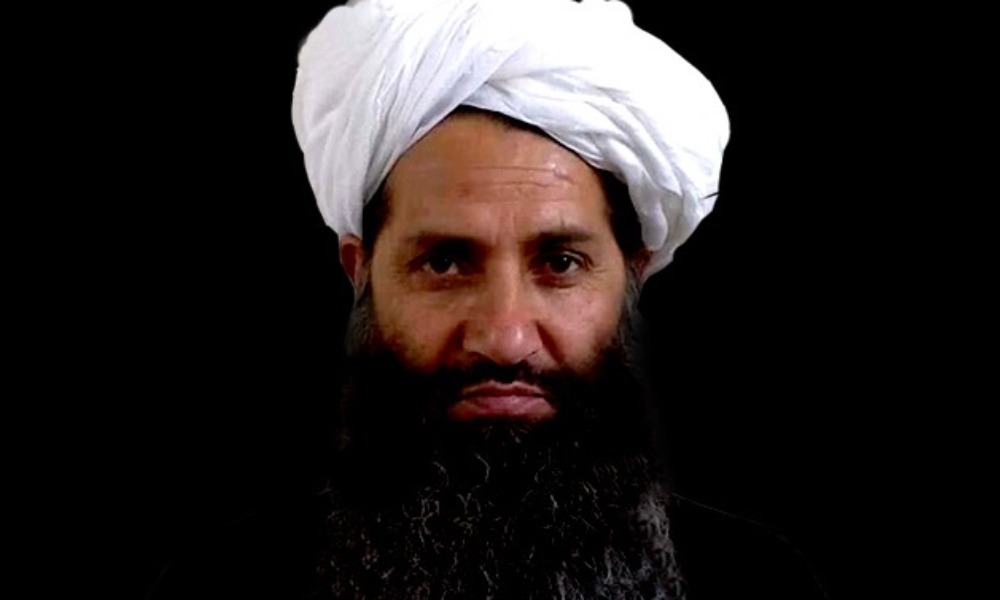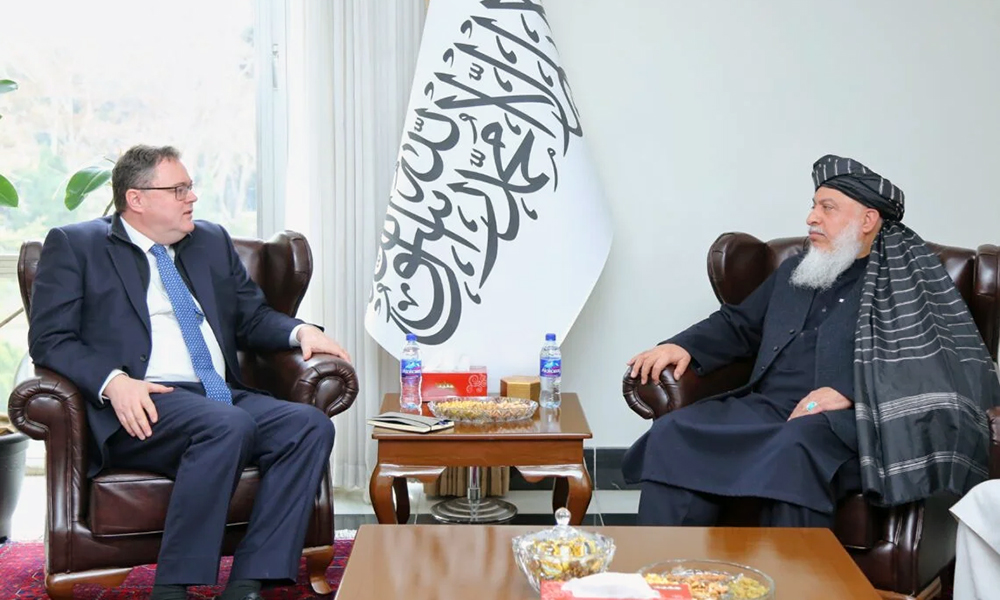Latest News
UN envoy says Afghanistan’s new rulers have no clear plan for good governance

The UN Secretary-General's Special Representative for Afghanistan, Deborah Lyons says the new Islamic Emirate of Afghanistan (IEA) government has an unclear strategy in terms of leading the political and economic situation.
In an interview with CNN, Lyons said the IEA does not have a clear plan for good governance and its economic plan is unclear.
She said she has met separately with the leaders of the new government, but no specific plans have been put forward so far.
“We have tried to find out what their views are on Afghanistan, how they want to develop this country, so far they do not have a clear definition in this regard, so far there is no plan to determine how they want to lead the country, if they have an economic plan, what is that?
“We are still working in separate meetings with the leaders to find out what the plans are for the future and overcoming the problems. We are currently acting as a bridge between Afghanistan and the international community,” said Lyons.
According to her, some leaders of the IEA agree that girls should go to school, but not everyone has yet reached a common decision.
“In my meeting with the leaders of the incumbent government, I found that some of them know that this issue is very important for the international community and they are in favor of reopening schools for girls, but others have the opposite view, a single position has not yet been formed.
“Afghanistan is the only country in the world where girls are not allowed to go to school,” said Lyons.
At the same time, former President Hamid Karzai has welcomed the IEA’s desire to have good diplomatic relations with the United States and other international countries, but said he hopes the new rulers decide as soon as possible on the reopening of girls' schools.
“Sirajuddin Haqqani spoke of the government's willingness to have good diplomatic relations with the United States and the international community which is in the interest of Afghanistan. He [Haqqani] also said that the girls would return to school soon, which I hope would happen as soon as possible,” said Karzai.
Speaking to CNN, Karzai said the issue of hijab was clear. “Afghanistan is an Islamic country and the issue of women's hijab is very clear in Islam,” he said.
Afghan women already wore hijab, covering the face is not a hijab, covering the face by female media workers who appear on TV is also not a hijab; this is not Afghan culture, he said.
He called on the IEA to scrap the decision that women must cover their faces. On the issue of teenage girls not going to school, Karzai stated that girls need to return to school as soon as possible.
“I denounce it in the strongest words and want the Taliban (IEA) to allow girls to go back to school as soon as possible,” he said.
Karzai also confirmed a recent report by a US watchdog organization that the withdrawal of foreign troops from Afghanistan led to the military collapse of the republic.
According to Karzai, a number of other issues also contributed to this including, the Doha Agreement, and the more than 3,000 US airstrikes a year.
Latest News
Human traffickers should be sentenced to 1 to 3 years in prison: IEA leader

The Leader of the Islamic Emirate has issued a decree instructing the Ministry of Interior Affairs to prevent human trafficking and to arrest and refer culprits to military courts.
The decree containing six articles says that that military courts should sentence human traffickers to one year in prison for the first time, two years if repeated for the second time and three years if repeated for the third time.
The ministries of Hajj, information, telecommunications, borders, propagation of virtue, as well as religious scholars are asked to inform the public about the dangers and adverse consequences of travelling through smuggling routes.
The decree comes as the rate of migration has increased following the political change in Afghanistan in 2021.
Latest News
Eight Afghan migrants die as boat capsizes off Greek island

Eight Afghan migrants died after a speedboat carrying migrants capsized off Greece's eastern island of Rhodes on Friday, the Associated Press reported.
Greek authorities said that the capsizing was the result of the boat’s maneuvering to evade a patrol vessel.
A total of 18 migrants — 12 men, three women and three minors — all Afghan nationals, were rescued, Greece's coast guard said Saturday. The dead were also from Afghanistan, it said.
Some migrants remained hospitalized, with one in critical condition, authorities said.
Two Turkish citizens, ages 23 and 19, were arrested as the suspected traffickers. The boat sank after capsizing, the coast guard said.
The sinking off Rhodes was the second deadly incident involving migrants in the past week.
Seven migrants were killed and dozens were believed missing after a boat partially sank south of the island of Crete over the weekend — one of four rescue operations during which more than 200 migrants were rescued.
Latest News
Norwegian Chargé d’Affaires meets with IEA deputy foreign minister
Welcoming the diplomat’s visit to Kabul, Stanikzai underscored the importance of political relations between Afghanistan and Norway, the foreign ministry said in a statement.

The Norwegian Chargé d’Affaires for Afghanistan, Per Albert Ilsaas, on Saturday met with IEA’s Deputy Foreign Minister for Political Affairs, Sher Muhammad Abbas Stanikzai, in Kabul.
Welcoming the diplomat’s visit to Kabul, Stanikzai underscored the importance of political relations between Afghanistan and Norway, the foreign ministry said in a statement.
In addition to focusing on bilateral political, humanitarian, and other pertinent issues, the two sides expressed hope that continued engagement would lead to constructive solutions to related issues.
This comes two weeks after the Foreign Ministry Spokesman Abdul Qahar Balkhi expressed disappointment regarding the decision by the Norwegian government to downgrade diplomatic relations with Afghanistan.
Balkhi said in a post on X that such decisions should not be linked with internal affairs of other countries.
“Diplomatic engagement is most effective when it fosters mutual understanding and respect, even amidst differing viewpoints,” he stated.
“Access to consular services is a fundamental right of all nationals. We strongly urge all parties to prioritize this principle in the spirit of international cooperation,” he added.
-

 Sport5 days ago
Sport5 days agoZimbabwe’s opening ODI against Afghanistan abandoned
-

 World4 days ago
World4 days agoNorth Korean troops suffer 100 deaths, struggling in drone warfare, South Korea says
-

 Latest News2 days ago
Latest News2 days agoAfghan men must stand with women to support viable future of country: US envoy
-

 Latest News4 days ago
Latest News4 days agoTwo horror accidents on Kabul-Kandahar highway leave 52 dead
-

 Sport3 days ago
Sport3 days agoAfghanistan crush Zimbabwe by 232 runs in second ODI
-

 Regional5 days ago
Regional5 days agoIran’s president to make rare visit to Egypt for D-8 summit
-

 International Sports4 days ago
International Sports4 days agoLanka T10: Kandy Bolts in at 4th spot in playoffs after thrilling day
-

 World5 days ago
World5 days agoNATO takes over coordination of military aid to Kyiv from US, source says
























